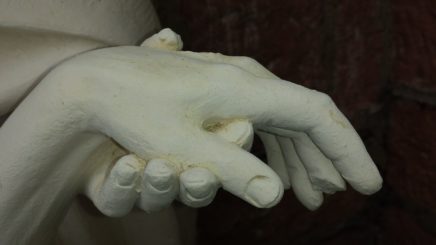
Editor’s Note: For the season of Lent, Ed Cyzewski has created a daily email list that shares quotes from Trappist monk and contemplative prayer author Thomas Merton. Each Friday here on the CSA website, Ed will share a few reflections on Merton’s wisdom for us today based on these readings.
The apostle Paul wrote to the Galatians, “And let us not grow weary in well-doing, for in due season we shall reap if we do not lose heart” (Galatians 6:9). That’s easy for him to write, but how should we counter the weariness of doing good and serving others?
…how should we counter the weariness of doing good and serving others?
From sleep-deprived parents, to those suffering from long term illness, to students and workers who have jam-packed schedules, weariness can feel all but inevitable. While we could come up with practical ways to change our schedules or to go through particular trainings with productive results, there’s also an inner motivation that can help us serve without a sense of weariness as well.
When Thomas Merton wrote about the inner experience of God’s love, he found that God delivered him from his illusions and fears that often served as barriers between himself and others. In addition, as the love of God took hold of his life, he began seeing others with the compassion of God. This dramatically reshaped how he viewed others and interacted with them.
Seeing the Life of God in Ourselves and Others
Granted, it’s an act of faith to believe that God is present in us. Without the benefit of a Pentecost experience, we may go on wondering if such an idea is too good to be true.
Writing about this spark of God in us in Conjectures of a Guilty Bystander, Thomas Merton offers the captivating promise that recognizing this gift of God is a pure gift, but the possibilities of God’s glory within us can surpass all that we would imagine or hope for:
“At the center of our being is a point of nothingness which is untouched by sin and by illusion, a point of pure truth, a point or spark which belongs entirely to God, which is never at our disposal, from which God disposes of our lives, which is inaccessible to the fantasies of our own mind or the brutalities of our own will.”
This little point of nothingness and of absolute poverty is the pure glory of God in us.
It is so to speak His name written in us, as our poverty, as our indigence, as our dependence, as our sonship.
It is like a pure diamond, blazing with the invisible light of heaven.
It is in everybody, and if we could see it we would see these billions of points of light coming together in the face and blaze of a sun that would make all the darkness and cruelty of life vanish completely…
I have no program for this seeing. It is only given. But the gate of heaven is everywhere.”
The Person Who Leaves Illusions Behind
In many of my struggles, the root issue is often a matter of illusion or a lack of clarity about God’s proximity to me or God’s loving acceptance. I can get wrapped up in the ways I present myself, in assuring my own comfort, or in meeting my own needs over the needs of others.
Solitude is one of the ways we can leave our illusions behind. In silence before God, I have no choice but to become fully present, as I am. Initially, I may feel that I am caught, that my game has been exposed, and that I can no longer hide behind my illusions or self-serving projects.
In silence before God, I have no choice but to become fully present, as I am.
However, out of this experience, God can begin to remove some of the obstacles that keeps me from enjoying the benefits of his love and mercy. In No Man Is an Island, Thomas Merton writes,
“The person who fears to be alone will never be anything but lonely, no matter how much he may surround himself with people.
But the person who learns, in solitude and recollection, to be at peace with his own loneliness, and to prefer its reality to the illusion of merely natural companionship, comes to know the invisible companionship of God.
Such a one is alone with God in all places and alone truly enjoys the companionship of others, because he loves them in God in Whom their presence is not tiresome, and because of Whom his own love for them can never know satiety.”
We Have the Security of God’s Acceptance
When we are at rest in God’s acceptance, we have less to defend and fewer perceived threats. Our identity is wrapped up in God, not in what we can project about ourselves or by proving ourselves worthy in some way.
Thomas Merton wrote about meditation leading us toward an awareness of God’s love and penetrating the depths of our lives. This is a foundation for our identity that no one can take away from us, whether we fail, succeed, or struggle with indecision.
In Contemplative Prayer, Merton wrote:
“The aim of meditation, in the context of Christian faith, is not to arrive at an objective and apparently ‘scientific’ knowledge of God, but to come to know him through the realization that our very being is penetrated with his knowledge and love for us.
Our knowledge of God is paradoxically a knowledge not of him as the object of our scrutiny, but of ourselves as utterly dependent on his saving and merciful knowledge of us.
It is in proportion as we are known to him that we find our real being and identity in Christ.
We know him and through ourselves in so far as his truth is the source of our being and his merciful love is the very heart of our life and existence. We have no other reason for being, except to be loved by him as our Creator and Redeemer, and to love him in return.
There is no true knowledge of God that does not imply a profound grasp and an intimate personal acceptance of this profound relationship.”
One of the ways to avoid growing weary of doing good is realizing that God never grows weary of loving us. We have nothing to prove, defend, or accumulate before God. We only have the gift of his love to receive and to grow in.
As we become rooted and established in God’s love, our perception of ourselves and of others will gradually change over time. Even if our bodies grow weary, we’ll have the inner capacity to see people as they are before God and in relation to ourselves as we also define ourselves through God’s vision.
This isn’t a quick fix or a simple 1-2-3 process. It’s a process of nurturing and growth that gradually helps us place the roots of our identity in God alone. As God renews our minds and grants us inner stability, we have a new source of energy and love to draw from when we begin to grow weary of doing good.
 Ed Cyzewski is the author of Flee, Be Silent, Pray: Ancient Prayers for Anxious Christians, A Christian Survival Guide: A Lifeline to Faith and Growth, and other books. He writes weekly at This Kinda Contemplative Life at Patheos, and he lives in Western Kentucky with his wife and children.
Ed Cyzewski is the author of Flee, Be Silent, Pray: Ancient Prayers for Anxious Christians, A Christian Survival Guide: A Lifeline to Faith and Growth, and other books. He writes weekly at This Kinda Contemplative Life at Patheos, and he lives in Western Kentucky with his wife and children.


